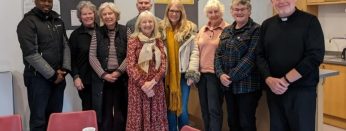On 6 May 2021, Caritas Social Action Network responded to the UK Government’s proposals for improved refugee resettlement in a consultation.
Overall Comments and Context
CSAN has co-ordinated community sponsorship of refugees by its member charities, Catholic dioceses and parishes in England and Wales. As at May 2021, 11 charities in the Caritas network were supporting 51 Catholic community sponsors in 15 out of 22 dioceses. 21 Catholic-run projects have welcomed 91 refugees of all faiths and none.
CSAN broadly welcomes the Government’s proposals on planned resettlement and Community Sponsorship. However, the New Plan’s central proposal to differentiate between cohorts of the most vulnerable, according to their method of travel, is deeply troubling.
Our faith invites us to recognise that God loves every person with an infinite love that ‘thereby confers infinite dignity all humanity’, in the words of Pope St John Paul II. We are called to respond to every person with equal care, compassion and dignity. Biblical Scripture contains repeated injunctions to welcome the stranger seeking sanctuary. For example:
‘The stranger who resides with you shall be to you as the citizen among you; you shall love the stranger as yourself.’ (Leviticus 19:33-34)
In September 2015, Pope Francis issued a call to welcome a refugee family into the heart of every Catholic community. In Fratelli Tutti (2020), he offered further encouragement on responding to the arrival of migrating people, including through community sponsorship. Proposals to differentiate between, and treat wholly differently, those prepared to risk their lives in search of safety, hope and a future, and the few chosen for safe arrival, are antithetical to Christian belief.
A 2020 study commissioned by the British Academy found that faith communities made positive contributions to social cohesion, social capital, safer and stronger communities.
A narrative that seeks to portray the most visible migrants as criminals, deserving of punishment and/or rejection, may undermine the work of Catholic and other communities to welcome, protect, promote and integrate refugees arriving in the UK, including those using planned and safe routes. Almost all refugees we have welcomed through Community Sponsorship began their journey to safety by arriving spontaneously in a new, ostensibly safer country to which they had not been invited. In that context, the New Plan’s self-described rationale amounts to welcoming some ‘criminals’ whilst rejecting others.
A more humane and more effective approach, to which CSAN can make a significant contribution, would harness the skills, experience and social capital of civil society, training community volunteers to offer casework and other forms of support. This would help to alleviate pressures referred to in the New Plan, whilst ensuring people are safe, accompanied, heard and treated with dignity and compassion. We would be pleased to engage with the Home Office on how this can be realised.
Planned Resettlement
We welcome in particular the Government’s assurances of a long-term commitment to resettle refugees, and willingness both to increase the numbers arriving through Community Sponsorship and to offer resettlement in response to international crises.
Sponsored refugees counting as additional to Local Authority commitments will act as an added incentive to sponsor, provided there is transparency around the numbers being pledged by participating Local Authorities. We trust that Government will ensure this is the case going forward.
We are grateful for the Government’s commitment to prioritise persecuted minorities, including Christians. ‘Open Doors’ has estimated that 260 million Christians have been experiencing ‘high or extreme’ persecution across 144 countries, representing 80% of all religious persecution worldwide. It is right that the Government commits to prioritising for resettlement a higher proportion of those persecuted for their beliefs.
Subject to appropriately rigorous UNHCR pre-departure assessments, including background checks, we support the proposal to grant resettled refugees Indefinite Leave to Remain on arrival. We urge the Government to extend this offer to refugees already here with time-limited Leave to Remain.
We welcome the proposal to review Family Reunion parameters. We believe there are improved health, well-being and resettlement outcomes for families whose sponsors were able to identify or ‘name’ extended family members for resettlement to the same region, for example including the parents and/or siblings of the resettled family’s parent(s).
We welcome the commitment to improve integration support. Our experience is that English language fluency, secure and well-paid employment, regular participation in the life of the community and a sense of belonging are all important indicators of successful integration.
We invite you to work with the Caritas network to develop programmes and initiatives that are most effective in achieving and measuring these outcomes.
Growing Community Sponsorship
A Government commitment to a minimum timeframe for the scheme’s operation would help to sustain confidence among sponsoring charities, communities and prospective funders. It would strengthen the collective resolve of the voluntary sector to grow the scheme.
A common theme, throughout the 5 years since the scheme was launched, has been the positive response of ordinary members of the public on hearing about Community Sponsorship, typically from a scheme volunteer or practitioner they happened to meet.
What has clearly been lacking thus far is a well-funded, national media campaign to promote the scheme to a wider audience, thereby boosting growth and broadening stakeholder participation. Government facilitation and/or active participation of government in such a campaign would be very welcome, thereby further endorsing and spreading the powerful message in the Foreword to the New Plan, namely that Britain is proud to welcome newcomers and has been enriched by their contribution.
The current scheme model relies on the willingness of charities and their trustees to accept legal responsibility for all aspects of scheme delivery. Charities in the Caritas network have offered professional support to local projects, including from experienced diocesan safeguarding teams, thereby ensuring high standards, and mitigating the risk of serious difficulty or project breakdown. With insufficient funding to cover their costs, charities with experience are beginning to withdraw from the scheme. Meanwhile, as at March 2020, when inbound resettlement flights were suspended due to Covid-19, the Government’s £23.4 million “exceptional costs” budget had disbursed less than £5 million in claims and total expenditure, including to meet claims from Local Authorities.
We encourage the Government to consider allocating £2-3 million from the ‘exceptional costs’ budget to principal sponsor organisations, via each faith or civic society network or lead charity, to ensure existing charities were retained, new charities engaged and new projects supported at scale over a period of 2-3 years. We consider that the resulting growth would, in turn, attract wider contributions, whilst allowing time to accrue additional income through self-funding contributions from community groups’ surplus fundraising. With an appropriate share of this funding, supported by additional measures as set out below, we estimate Catholic growth alone over the next 3 years to be in the region of a further 150 Community Sponsors. We hope the Government will see this as a worthwhile investment to help scale and secure the future of the scheme.
The new 2-step application process (PSAP) is a significant step towards reducing the length and complexity of the application process. We strongly recommend replacing the current process with the PSAP for all future applications as soon as possible. Uptake of the PSAP within the pilot phase was adversely impacted by the Covid-19 pandemic. There is scope for further streamlining of the PSAP (step 2) application form, particularly if supported by a single pre-approval assessment interview conducted by one of a small number of ‘approved’ principal sponsors, with the Home Office retaining final sign-off approval.
Approving principal sponsors with a proven track record to undertake pre-approval assessments would be a manageable step towards ‘Sponsorship Hubs’, similar to the Canadian model.
Securing affordable housing for a minimum of two years remains a significant challenge in most areas. Urgent intervention by central government and/or Local Authorities is needed to help groups secure appropriate housing. Light-touch measures might include providing company let/sub-let tenancies and reducing sign-up bureaucracy, in return for the intensive wraparound support and tenancy oversight that groups already provide.
Finally, we note the recent policy change whereby local authorities will determine resettlement capacity and numbers in each region, whilst community sponsors will still be reliant on Local Authority consent. We consider this an avoidably protracted and opaque process. There is further potential to explore adapted models of resettlement, in dialogue with local councils. We would be grateful for the support of the Home Office in enabling further discussion between principal sponsors, SMPs and Local Authorities to that end.
We remain committed to working with the Home Office to nurture and improve Community Sponsorship, enabling us to continue transforming the lives of refugees and revitalising our communities.






